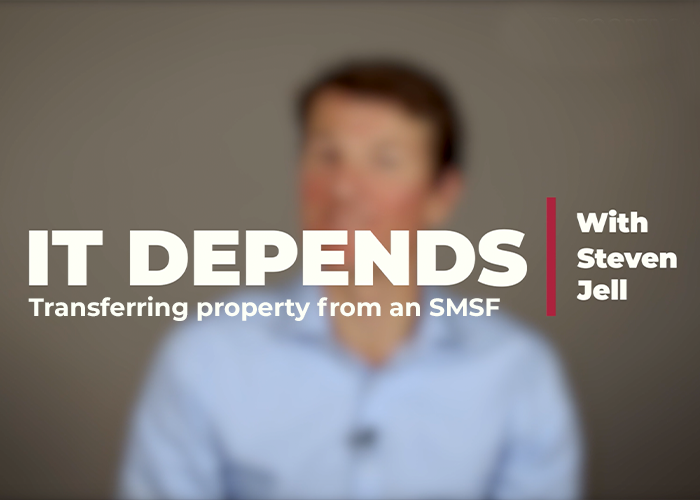In this edition of ‘It depends’, senior associate Steven Jell talks about transferring property from an SMSF.
Video transcript
Hi and welcome to It depends. In a previous edition, we discussed transferring property to an SMSF. Today we’re going to discuss transferring property from an SMSF.
What is a member payment?
So, there are limitations on the circumstances in which an individual can access their superannuation entitlements. But basically a member payment is a payment to you because you are a member of a superannuation fund. Now in order to access your superannuation entitlements, you need to satisfy something known as a condition of release. These include turning 65 years of age, retirement, incapacity and you’re unable to access your superannuation entitlements unless you’ve satisfied a condition of release.
Can I transfer an asset from my SMSF as a member payment?
So, it depends. The transfer of an asset as compared to a cash payment is generally referred to as an ‘in-specie transfer’. The value of the total assets within the fund decrease by the value of the asset being transferred and the individual’s member balance similarly decreases by the value of the asset that they receive.
Who can the asset be transferred to?
Member payments can generally only be paid to an individual member. Now, there are some specific circumstances where, depending on the asset that is being transferred, members would like to have that asset transferred to a trust or another company for various reasons. So, there are some strategies that can be implemented to achieve those particular outcomes.
What types of assets can be transferred?
So, it’s possible for any asset that can be held in a superannuation fund to be transferred out of the fund by way of an in-specie transfer of a member payment. Now depending on the entity that manages that asset, there may be some specific requirements of that relevant entity. For example, the share registry, the Titles Office or another asset manager might have some particular paperwork that needs to be completed in order to complete the transfer of the asset.
What do I need to do before transferring an asset in-specie?
So, it depends. We need to look at a number of different things and in particular, we look at the member’s circumstances as well as the asset we’re looking to transfer. A good starting point is the trust deed for the fund. Does it permit in-specie transfers of assets? Does it set out a specific process that must be followed in order to implement a strategy like this? The asset itself must also be transferred for market value. So, we need to make sure the member has enough member entitlements in the fund that we’re looking to pay out, equal to the value of the asset. If the member’s entitlements are less than the value of the asset we’re looking to transfer, then there may be circumstances in which we can transfer a proportion of the asset out to the member and leave the remaining proportion of the asset in the fund itself. So, there will also be tax consequences to consider as the transfer of the asset will likely be treated as a tax event for CGT purposes. And if we’re dealing with real estate, we need to consider the transfer duty consequences as well because there may not be an exemption or concession for the duty that would otherwise be payable on the transfer of that asset, depending on the eventual recipient of the asset, there may also be some estate planning and asset protection issues to work through. If you, one of your team, or one of your clients would like to discuss transferring assets from an SMSF, please feel free to contact me or one of the team. Thank you for watching this edition of It depends.




